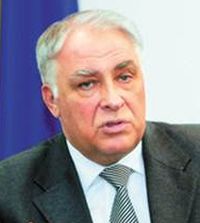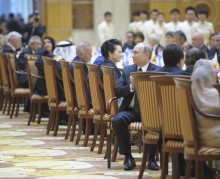It was literally in the waning hours of May 21 that Gazprom signed an agreement on gas supplies with the China National Petroleum Corporation. Gazprom’s chief executive Alexei Miller told the press that the total value of the 30-year “contract of the century” was 400 billion dollars. He did not state the price of gas, saying that it was a trade secret. Director of the Institute for Energy Studies Dmytro Marunych told The Day that the Ukrainian crisis and a deterioration of relations between Europe and Russia contributed to making this gas contract happen. “Even though the contract was signed literally at the last moment possible,” the expert said, “it is hardly possible that Gazprom will be supplying gas at a loss under it. It somehow resembles the case of the Kharkiv Agreements when Ukraine was granted a discount amounting to 100 dollars. It is another matter that under the contract terms, the Russian budget will lose income from the tax on the extraction of minerals, benefiting Chinese companies that will operate in Russia.” The signing of the gas deal prompted a rather active discussion on social networks. In particular, journalist Pavel Sheremet tweeted: “Russian gas will flow to China only from 2018, while the country’s exclusion from Europe begins now.” Another user going by the nickname Hy Donetsk made a following remark on the event: “It seems that the Chinese will become the Russians’ new brothers, replacing the Ukrainians; however, it is the Chinese who will be the elder wily brothers in this pair!”
The first foreign visit of Russia’s President Vladimir Putin after the annexation and occupation of Crimea virtually ended with a failure. The formal reason of the two-day visit of the Kremlin leader was his participation in the Conference on Interaction and Confidence Building Measures in Asia. Perhaps, the events in Crimea had to open eyes for many, including Asia, as to whether Russia can be trusted. But it is evident that Putin’s main goal was to propagate a contract between Gazprom and CNPC on piping Russian gas to China and the beginning of the new stage of Russia-China partnership.
Andrii Plakhonin wrote on his Facebook page, “China stubbornly holds ground at the minimum price, and negotiations are about the search for ways to make this price at least marginally profitable for Russia. The only concession China made was agreeing not to charge import duties on Russian gas supplied according to this contract. In its turn, Russia was forced to cancel all taxes and fees in its budget for extraction and export of this gas. As a result, if the contract is signed, Russian budget will basically get no profit from it. And even for this questionable result, Putin had to make huge preferences to China in terms of raw materials and infrastructure. “Elginsk coal deposit in the Republic of Sakha (Yakutia), which was developed by Mechel, Timir iron ore asset, which belongs to Alrosa, and also a number of explored but undeveloped coal and metal deposits will be used by Chinese companies. Moreover, China received a right for independent creation of infrastructure for their development: from the construction of access roads to unobstructed delivery of the workforce.” All this proved once more that China knows how to bargain and understands perfectly well that Russia has hardly any levers that can influence the second largest economy after the US one.
 The Day addressed former ambassador of Ukraine to the People’s Republic of China Yurii KOSTENKO with a request to comment on the two-day visit of the Russian president to China and the ways for Ukrainian diplomacy to manage affairs with China.
The Day addressed former ambassador of Ukraine to the People’s Republic of China Yurii KOSTENKO with a request to comment on the two-day visit of the Russian president to China and the ways for Ukrainian diplomacy to manage affairs with China.
“As a first ambassador of Ukraine at the Vienna conference on confidence building measures in Europe (1994-96), I have repeatedly explained in Tokyo and Beijing the importance and effectiveness of aggression and arrogance in politics preventive mechanisms, created by European states.
“However, as the Crimean experience showed, a manic aggressor is not affected by any mechanisms or confidence measures. When preparing for the war in Chechnya over 20 years ago, Russia has neglected the so-called flank limitations recorded in documents, that is, specific parameters of heavy armaments of a common category positioning in Caucasus. Now after Crimea, basic regulations of documents that have served as a restraint jacket for a potential aggressor have been destroyed. Just as Hitler did not give a damn about the League of Nations, Putin did the same to measures of confidence and collective security in Europe.
“If Putin displayed aggression against the people who actually created Muscovy (remember who Yuri Dolgoruky is – a Kyiv prince, who brought Orthodoxy to northern forests and swamps, who sowed the seeds of intellectual activity in Muscovy), what can be said about other nations on their western or eastern borders. All this is brutally thrown away.
“Those who sit down at the negotiations table in Shanghai today to discuss the issues of interaction and confidence building in Asia, should have a clear understanding that it is more than simple for Putin to cancel out any agreements, multilateral or bilateral ones. In the first place, Russia’s neighbors in Central Asia must remember this. It is no coincidence that one of the Russian politicians has already spoken about the protection of the Russian-speaking population in Kazakhstan and territorial claims against the Kazakhs. That is the actual level of trust for aggressor Putin. That is why his participation in this event is merely a formality and fiction from the point of view of real confidence building measures.
“It is curious that Putin did not miss an opportunity to ‘play at soldiers’ in Shanghai, as he eagerly does in Russia. He will participate in the opening of the naval training ‘Naval Cooperation 2014.’ Given that Russia sees counteraction to the US interests in Asia, especially in Central Asia, as one of its main goals at the Shanghai Cooperation Organization (SCO), any training involving Russia in the Asian region should be viewed from this perspective.
“It is significant that the current Putin’s visit to Shanghai was accompanied by typical Soviet actions, organized by both Russian and Chinese sides. A presentation of collection of Putin’s speeches in Chinese took place. All this reminds of the late Brezhnev’s times, whom Soviet propaganda molded into a great peacemaker (against the background of the war in Afghanistan). Do Kremlin and Beijing propagandists understand that history is being repeated, and against the background of the aggression against Ukraine? Even in the language of the multibillion population of China, Putin’s words will be merely a fig leaf for the politics of invaders and aggressors. I wonder if Putin’s ‘revelations’ that my state has no right for existence and it is virtually not a state, and his other anti-Ukrainian maxims were included into this 700-page publication.”
What can you say about the meaning of the signing of agreement on supply of 38 billion of cubic meters of gas annually for 30 years to China, which in Russia is de facto considered to be a union of two states and creation of an anti-Western bloc, which will not fear the West’s sanctions?
“Negotiations on this matter have been in process for many years. When I served as an ambassador to China, they were stalled for the following reason. Russia wanted to sell gas to China at a price it sells it to Europe, but China said, no, why would we need this, if we can buy for less than 300 dollars from Vietnam and Indonesia. And this hindered the process. Today the price seems to be around 350 to 380 dollars. If China signs a contract with such price, they will give in.
“In the conditions of economic sanctions imposed by the West (the US, Canada, and the EU), Gazprom’s survival lies in this new project. It was previously foreseen by Russians. And they started doing this diversification ten years ago. As for the formation of a strategic energy alliance, these are really Putin’s words.”
Who benefits more from this situation: Russia or China?
“I am a great admirer of the Chinese people and culture, but not of the Chinese leadership, which in fact is far from democratic. That is why they love Putin just as they loved Yanukovych. Birds of a feather flock together, they say.
“Aside from economic and geographic factors, there is a matter of flair here. They can smell each other, especially now. So far, the Chinese settled their territorial questions, Russians have successfully given Damansky Island to them. Ideologies of these two nations are different, but they are close in spirit. If we talk about the SCO, this institution is built on the basis of two postulates, Russian and Chinese. China wants to counteract Russia and the US, and Russia wants to counteract China and the US. That is how they fight each other and want to accomplish something.”
How is everything mentioned above projects on our relations with China?
“I want to remind that it took three tries to become strategic partners with China. First time Kravchuk went to Taiwan when a document was ready for signing, in which we indicated strategic partnership. Second time Yushchenko did not go to the Olympics, and only during Yanukovych’s presidency this document was signed.
“And now the question is how strategic partnership works in the current conditions. As the experience of Crimea showed, our ways have parted. Russia and Putin are the first priority for China, they do not want to fight, even though they hide behind their neutral status.
“At the same time, strategic partnership between our two countries cannot be thrown away. We cannot quarrel with China, a member of the UN Security Council and virtually the second largest economy in the world.
“We cannot break strategic partnership, but we have to understand clearly that there are various types of this partnership. And it is a task for those holding office today.
“That is why attention should be paid to the fact that China is a specific strategic partnership, because we have separated in terms of ideology. It is drastically different there, not of the European Union’s Western kind, let alone NATO. And they react to the EU very nervously, because they understand we merge with the European system of values and drift away from Russia.”
What advice can you give to those who will develop relations with China?
“Firstly, the People’s Republic of China, a huge state in terms of economy and culture, cannot be viewed as a toy. Actions should be taken to resolve certain problems, but the Chinese factor cannot be used to demonstrate that ‘you do not want to do business with us, so we will do it with China.’ Opportunistic approach cannot be used in our relations with China. It must be deliberate, calculated with the use of mathematical approaches, and analysis of the strategic partnership, real one, not declared.
“In other words, China must be perceived as a very specific state. In reality, it is a Colossus we must cooperate with, not argue.
“A real concept of cooperation must be designed. The experience of the years I have worked there shows that a third party should not be allowed to join the managing of the activity of our embassy in China. External policy cannot be turned into a good, as it happened in China before.
“Therefore, clear mind must be preserved in our internal diplomatic work, people who do not understand anything but their own business and profit should not be allowed to interfere with diplomatic work.”








